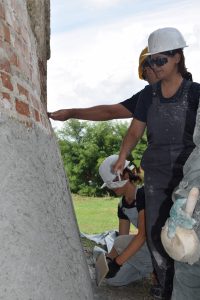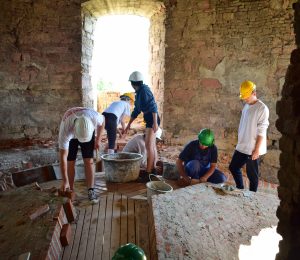Built Heritage Conservation Training
Since 1999, the educational programmes offered by Transylvania Trust have included built heritage conservation trainings, and since 2001, their permanent location has been Bánffy Castle, Bonțida.
The main purpose of the centre is to promote excellence in the conservation of the historic environment and specifically to teach traditional building craft skills which can be utilised in the repair and maintenance of historic buildings. The centre promotes a policy of minimal intervention, compatibility of techniques and materials, and the use of local resources in historic building repair. It also promotes a philosophy of analysing, understanding, and recording historic buildings before and during intervention. It supports an integrated approach to the restoration of historic buildings. Since the conservation of the historical environment requires the cooperation of many professions, in addition to the usual practical training, it also provides field training for landscape architects, art historians and archaeologists. The centre supports the real cooperation between craftsmen, construction site managers and designers, considering it important to respect and recognize craftsmanship.
The courses consist of two-week modules, offering a theoretical and practical understanding of the care for the historic environment. Emphasis is placed on the practical training of the students, who are directly involved in the restoration of the castle through their activities in the masonry, carpentry, furniture restoration and stone carving workshops. Since 2011, the practical training offer has been enriched: students can now learn about the use of lime and decorative techniques (stucco, marmorino, sgraffito, fresco). The workshops are led jointly by craftsmen from Romania. At the beginning of the modules, the participants receive theoretical education regarding the principles and methods of built heritage conservation. The lectures are held by university lecturers, as well as heritage conservation specialists from England and Romania. In addition to construction industry workers, in recent years the focus has been on students (mainly in architecture and civil engineering, but also in archaeology and art history), who complete their summer practice within the framework of the programme. Their training is particularly important, as in the future these highly qualified professionals will be the ones that design and manage the restoration and maintenance of architectural heritage. Transylvania Trust, together with Babeş-Bolyai University in Cluj-Napoca, organises a postgraduate course in the field of built heritage conservation, the students of which also receive practical training at Bonțida. Those who successfully complete the postgraduate course, receive a certificate recognised by the Ministry of Culture, which is now widely accepted by the Romanian restoration industry.
So far more than 3000 participants from 32 countries (Romania, Hungary, Austria, Luxembourg, Egypt, Slovakia, Slovenia, Czech Republic, Poland, Estonia, Sweden, Latvia, France, Belgium, Kosovo, Montenegro, Albania, Serbia, Bosnia and Herzegovina, Croatia, Russia, Finland, Ireland, the United Kingdom, Brazil, Australia, the United States of America, Greece, Moldova, Norway, Spain, Portugal) have received training in Bonțida. In terms of their professional background, the students cover all areas related to built heritage conservation.
Through the training, the participants also contribute to the castle’s restoration. Although none of the buildings have been restored completely, in the areas intervened upon the destruction has ceased. These include the kitchen building, where the cultural cafe operates, and a kitchen, dining hall and guest rooms serve the training centre participants. The classrooms, offices, and teacher guest rooms of the training centre are located on two levels and partly the upper floor of the Miklós building, which was rebuilt from its ruins. The chapel, which is part of the main building, is now a community centre. The partially renovated stables house restoration workshops, but this area also serves as a multifunctional room, an alternative venue for film screenings, classical music concerts and theatre performances. A reception room and the museum spaces of the Lost&Found. Lapidarium await visitors in the entrance gate, which has also been partially restored.
In 2008, the training programme received the European Union’s highest recognition for heritage conservation activities: the Europa Nostra Award. The dual nature of the training programme played a primary role in awarding this prize: the practical part of the training is carried out through participating in the castle’s restoration.
The Transylvania Trust is launching an invitation for participants to take part in a “hands-on” learning experience in the field of historic building conservation.
Duration of the courses
1 Module: 4 – 17 August 2024
Click here for the details.
2 Module: 18 – 31 August 2024
Click here for the details.




